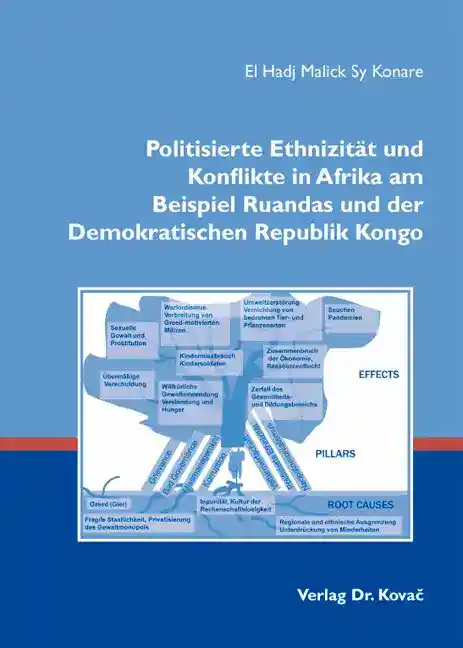El Hadj Malick Sy KonarePolitisierte Ethnizität und Konflikte in Afrika am Beispiel Ruandas und der Demokratischen Republik Kongo
Studien zur Konflikt- und Friedensforschung, volume 10
Hamburg 2012, 390 pages
ISBN 978-3-8300-6645-3 (print) |ISBN 978-3-339-06645-9 (eBook)
About this book deutschenglish
The sub-Saharan African region is plagued with unremitting armed conflicts since the end of the "cold war". These violent armed fights mainly take place within a limited territorial unit and are thus intrastate conflicts, but often express negative regional destabilizing effects. Western media often portrayed these conflicts as ethnic and tribal fights. This limited interpretation excludes many factors which significantly contribute to the outbreak of such conflicts. Because sensitive issues related to unequal distribution of political power and economic resources are certainly at the core of such conflicts. In such situations ethnicity and/or the affiliation to clan-like constellations engender a culture of political patronage which generates perceptions of inequality among the different social and ethnic groups of the country. In such a context of endemic corruption economic inequality is manifested along ethnic and regional lines. Whenever people are disadvantaged by political, legal, economic or cultural traditions and are victim of an unequal access to resources, to political power, to education, to health care, or to legal standing “structural violence” occurs. Johan Galtung originally framed the term “structural violence” to refer to any constraint on human potential due to economic and political structures (1969). Because they are longstanding these structural inequalities generate a deep gap between the majority of the people and the corrupt power-holding elite. These structures of social inequality are indeed explosive phenomena. They cause frustrations and feelings of discrimination which are usually manipulated by some unethical political leaders so that social conflicts can easily turn to interethnic conflicts. For that reason it is important to point out and recognize that ethnic differences or identities are not the causes but the result of the instrumentalization or politicization of ethnicity for other purposes, which must be identified as the genuine causes and driving forces of such conflicts. The aim of the present work is to undertake an analysis of the root causes of intrastate conflicts in sub-Saharan Africa based on the case studies of Rwanda and the Democratic Republic of Congo, and propose an approach on how to prevent such conflicts. Thereby my Central thesis that ethnic differences alone do not produce any violent conflicts but could serve as catalyst or amplifier of conflicts will be reviewed. Overcoming the trauma through the decades of violence and ending such conflicts is only through an effect-oriented approach and non-violent methods of conflict transformation possible. It is however a fact that the successes of the United Nations peacekeeping operations have still now remained modest. In fact, the populations in the Eastern region of the Democratic Republic of Congo are still suffering from the incessant violent armed conflicts despite the massive presence of the biggest UN mission (MONUSCO United Nations Mission in Congo) to date. Against this background we shall explore alternative approaches to military intervention and the mediation of outsiders. As a process of transforming the deficient and inequitable social structures that support the continuation of violent conflict, non-violent methods of conflict transformation could be understood as vital catalysts for change. For this reason, a nonviolent approach of conflict transformation based on the concept of the "Oasis of peace" with clear “Bottom Up” characteristics is designed as alternative to the habitual interventions of the UN-Peace forces.Keywords
Colonialism and postcolonial mismanagementGreedPeaceful conflict transformationresource-induced conflicts and instrumentalization of ethnicityIhr Werk im Verlag Dr. Kovač

Möchten Sie Ihre wissenschaftliche Arbeit publizieren? Erfahren Sie mehr über unsere günstigen Konditionen und unseren Service für Autorinnen und Autoren.
